Haolin Yang
APEX: Learning Adaptive Priorities for Multi-Objective Alignment in Vision-Language Generation
Jan 10, 2026Abstract:Multi-objective alignment for text-to-image generation is commonly implemented via static linear scalarization, but fixed weights often fail under heterogeneous rewards, leading to optimization imbalance where models overfit high-variance, high-responsiveness objectives (e.g., OCR) while under-optimizing perceptual goals. We identify two mechanistic causes: variance hijacking, where reward dispersion induces implicit reweighting that dominates the normalized training signal, and gradient conflicts, where competing objectives produce opposing update directions and trigger seesaw-like oscillations. We propose APEX (Adaptive Priority-based Efficient X-objective Alignment), which stabilizes heterogeneous rewards with Dual-Stage Adaptive Normalization and dynamically schedules objectives via P^3 Adaptive Priorities that combine learning potential, conflict penalty, and progress need. On Stable Diffusion 3.5, APEX achieves improved Pareto trade-offs across four heterogeneous objectives, with balanced gains of +1.31 PickScore, +0.35 DeQA, and +0.53 Aesthetics while maintaining competitive OCR accuracy, mitigating the instability of multi-objective alignment.
SoccerMaster: A Vision Foundation Model for Soccer Understanding
Dec 11, 2025Abstract:Soccer understanding has recently garnered growing research interest due to its domain-specific complexity and unique challenges. Unlike prior works that typically rely on isolated, task-specific expert models, this work aims to propose a unified model to handle diverse soccer visual understanding tasks, ranging from fine-grained perception (e.g., athlete detection) to semantic reasoning (e.g., event classification). Specifically, our contributions are threefold: (i) we present SoccerMaster, the first soccer-specific vision foundation model that unifies diverse understanding tasks within a single framework via supervised multi-task pretraining; (ii) we develop an automated data curation pipeline to generate scalable spatial annotations, and integrate them with various existing soccer video datasets to construct SoccerFactory, a comprehensive pretraining data resource; and (iii) we conduct extensive evaluations demonstrating that SoccerMaster consistently outperforms task-specific expert models across diverse downstream tasks, highlighting its breadth and superiority. The data, code, and model will be publicly available.
Towards Robust Visual Continual Learning with Multi-Prototype Supervision
Sep 19, 2025
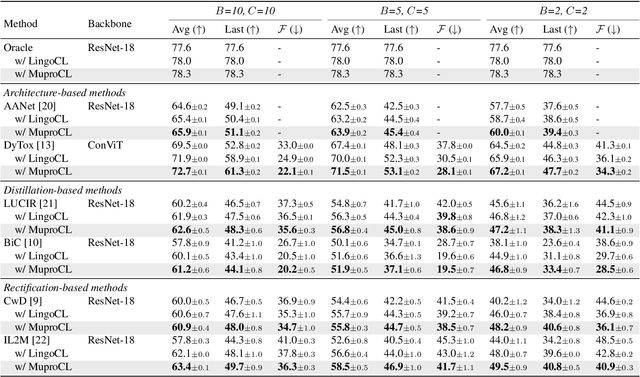
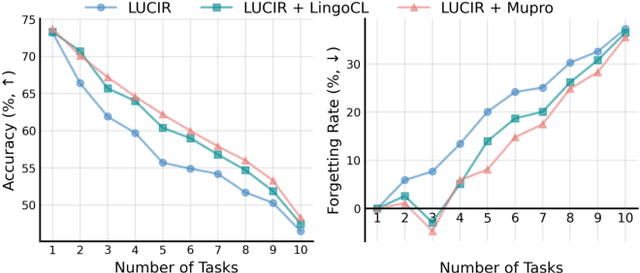
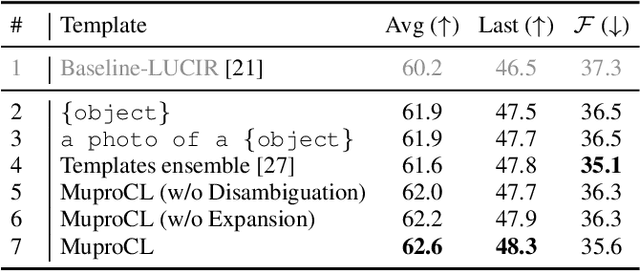
Abstract:Language-guided supervision, which utilizes a frozen semantic target from a Pretrained Language Model (PLM), has emerged as a promising paradigm for visual Continual Learning (CL). However, relying on a single target introduces two critical limitations: 1) semantic ambiguity, where a polysemous category name results in conflicting visual representations, and 2) intra-class visual diversity, where a single prototype fails to capture the rich variety of visual appearances within a class. To this end, we propose MuproCL, a novel framework that replaces the single target with multiple, context-aware prototypes. Specifically, we employ a lightweight LLM agent to perform category disambiguation and visual-modal expansion to generate a robust set of semantic prototypes. A LogSumExp aggregation mechanism allows the vision model to adaptively align with the most relevant prototype for a given image. Extensive experiments across various CL baselines demonstrate that MuproCL consistently enhances performance and robustness, establishing a more effective path for language-guided continual learning.
Unifying Attention Heads and Task Vectors via Hidden State Geometry in In-Context Learning
May 24, 2025Abstract:The unusual properties of in-context learning (ICL) have prompted investigations into the internal mechanisms of large language models. Prior work typically focuses on either special attention heads or task vectors at specific layers, but lacks a unified framework linking these components to the evolution of hidden states across layers that ultimately produce the model's output. In this paper, we propose such a framework for ICL in classification tasks by analyzing two geometric factors that govern performance: the separability and alignment of query hidden states. A fine-grained analysis of layer-wise dynamics reveals a striking two-stage mechanism: separability emerges in early layers, while alignment develops in later layers. Ablation studies further show that Previous Token Heads drive separability, while Induction Heads and task vectors enhance alignment. Our findings thus bridge the gap between attention heads and task vectors, offering a unified account of ICL's underlying mechanisms.
ExeSQL: Self-Taught Text-to-SQL Models with Execution-Driven Bootstrapping for SQL Dialects
May 22, 2025Abstract:Recent text-to-SQL models have achieved strong performance, but their effectiveness remains largely confined to SQLite due to dataset limitations. However, real-world applications require SQL generation across multiple dialects with varying syntax and specialized features, which remains a challenge for current models. The main obstacle in building a dialect-aware model lies in acquiring high-quality dialect-specific data. Data generated purely through static prompting - without validating SQLs via execution - tends to be noisy and unreliable. Moreover, the lack of real execution environments in the training loop prevents models from grounding their predictions in executable semantics, limiting generalization despite surface-level improvements from data filtering. This work introduces ExeSQL, a text-to-SQL framework with execution-driven, agentic bootstrapping. The method consists of iterative query generation, execution-based filtering (e.g., rejection sampling), and preference-based training, enabling the model to adapt to new SQL dialects through verifiable, feedback-guided learning. Experiments show that ExeSQL bridges the dialect gap in text-to-SQL, achieving average improvements of 15.2%, 10.38%, and 4.49% over GPT-4o on PostgreSQL, MySQL, and Oracle, respectively, across multiple datasets of varying difficulty.
ScalingNoise: Scaling Inference-Time Search for Generating Infinite Videos
Mar 20, 2025Abstract:Video diffusion models (VDMs) facilitate the generation of high-quality videos, with current research predominantly concentrated on scaling efforts during training through improvements in data quality, computational resources, and model complexity. However, inference-time scaling has received less attention, with most approaches restricting models to a single generation attempt. Recent studies have uncovered the existence of "golden noises" that can enhance video quality during generation. Building on this, we find that guiding the scaling inference-time search of VDMs to identify better noise candidates not only evaluates the quality of the frames generated in the current step but also preserves the high-level object features by referencing the anchor frame from previous multi-chunks, thereby delivering long-term value. Our analysis reveals that diffusion models inherently possess flexible adjustments of computation by varying denoising steps, and even a one-step denoising approach, when guided by a reward signal, yields significant long-term benefits. Based on the observation, we proposeScalingNoise, a plug-and-play inference-time search strategy that identifies golden initial noises for the diffusion sampling process to improve global content consistency and visual diversity. Specifically, we perform one-step denoising to convert initial noises into a clip and subsequently evaluate its long-term value, leveraging a reward model anchored by previously generated content. Moreover, to preserve diversity, we sample candidates from a tilted noise distribution that up-weights promising noises. In this way, ScalingNoise significantly reduces noise-induced errors, ensuring more coherent and spatiotemporally consistent video generation. Extensive experiments on benchmark datasets demonstrate that the proposed ScalingNoise effectively improves long video generation.
Counterfactual Language Reasoning for Explainable Recommendation Systems
Mar 11, 2025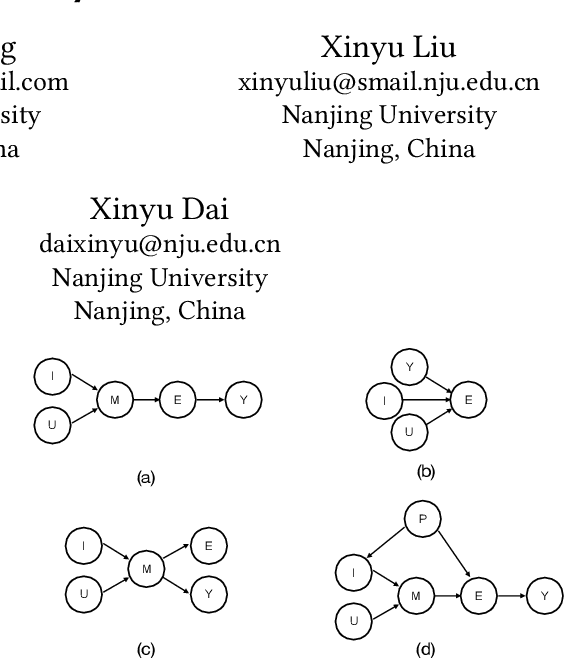
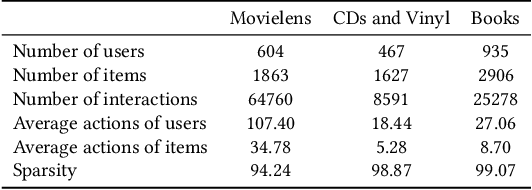
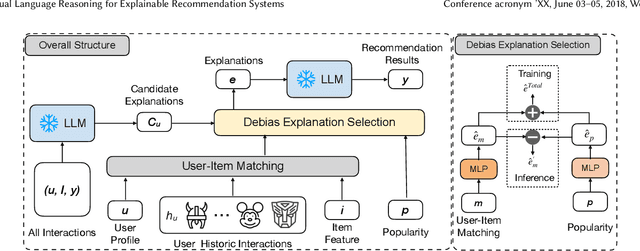

Abstract:Explainable recommendation systems leverage transparent reasoning to foster user trust and improve decision-making processes. Current approaches typically decouple recommendation generation from explanation creation, violating causal precedence principles where explanatory factors should logically precede outcomes. This paper introduces a novel framework integrating structural causal models with large language models to establish causal consistency in recommendation pipelines. Our methodology enforces explanation factors as causal antecedents to recommendation predictions through causal graph construction and counterfactual adjustment. We particularly address the confounding effect of item popularity that distorts personalization signals in explanations, developing a debiasing mechanism that disentangles genuine user preferences from conformity bias. Through comprehensive experiments across multiple recommendation scenarios, we demonstrate that CausalX achieves superior performance in recommendation accuracy, explanation plausibility, and bias mitigation compared to baselines.
Self-Supervised Monocular Depth Estimation in the Dark: Towards Data Distribution Compensation
Apr 22, 2024



Abstract:Nighttime self-supervised monocular depth estimation has received increasing attention in recent years. However, using night images for self-supervision is unreliable because the photometric consistency assumption is usually violated in the videos taken under complex lighting conditions. Even with domain adaptation or photometric loss repair, performance is still limited by the poor supervision of night images on trainable networks. In this paper, we propose a self-supervised nighttime monocular depth estimation method that does not use any night images during training. Our framework utilizes day images as a stable source for self-supervision and applies physical priors (e.g., wave optics, reflection model and read-shot noise model) to compensate for some key day-night differences. With day-to-night data distribution compensation, our framework can be trained in an efficient one-stage self-supervised manner. Though no nighttime images are considered during training, qualitative and quantitative results demonstrate that our method achieves SoTA depth estimating results on the challenging nuScenes-Night and RobotCar-Night compared with existing methods.
TACO: Benchmarking Generalizable Bimanual Tool-ACtion-Object Understanding
Jan 16, 2024Abstract:Humans commonly work with multiple objects in daily life and can intuitively transfer manipulation skills to novel objects by understanding object functional regularities. However, existing technical approaches for analyzing and synthesizing hand-object manipulation are mostly limited to handling a single hand and object due to the lack of data support. To address this, we construct TACO, an extensive bimanual hand-object-interaction dataset spanning a large variety of tool-action-object compositions for daily human activities. TACO contains 2.5K motion sequences paired with third-person and egocentric views, precise hand-object 3D meshes, and action labels. To rapidly expand the data scale, we present a fully-automatic data acquisition pipeline combining multi-view sensing with an optical motion capture system. With the vast research fields provided by TACO, we benchmark three generalizable hand-object-interaction tasks: compositional action recognition, generalizable hand-object motion forecasting, and cooperative grasp synthesis. Extensive experiments reveal new insights, challenges, and opportunities for advancing the studies of generalizable hand-object motion analysis and synthesis. Our data and code are available at https://taco2024.github.io.
 Add to Chrome
Add to Chrome Add to Firefox
Add to Firefox Add to Edge
Add to Edge